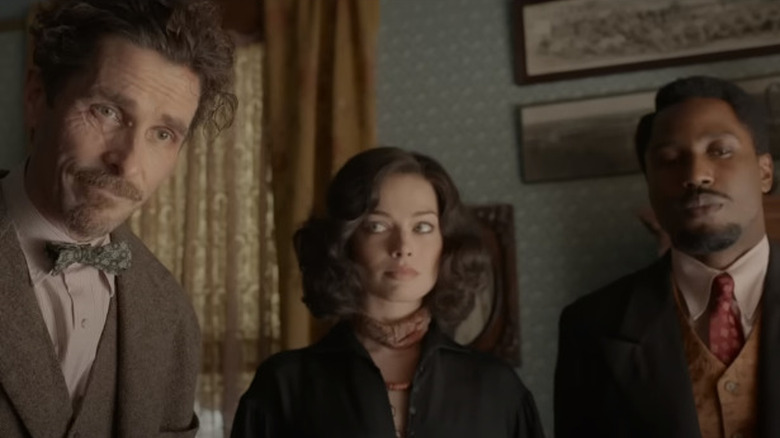Here's What Amsterdam Flopping Could Mean For The Future Of Cinema
It would appear that, for all the anticipation and marketing, the makers of "Amsterdam" missed the mark. The absurdist period comedy, based on the infamous 1933 "Business Plot" in which several wealthy businessmen conspired to overthrow President Franklin Roosevelt in a coup, is being called a dud by reviewers. The opening of Christy Lemire's review at RogerEbert.com just about says it all. "Simultaneously overstuffed and undernourished, frantic and meandering, 'Amsterdam' is one big, star-studded, hot mess of a movie." Currently it comes in at a cringey 34% at Rotten Tomatoes.
Unfortunately for director David O. Russell –- as well as the litany of stars appearing in the movie, from Christian Bale to Margot Robbie and Chris Rock to Anya Taylor-Joy –- the box office seems to match the critics' withering assessments. The $80 million movie came in a distant third on its opening weekend, falling after "Smile" and "Lyle, Lyle, Crocodile," and pulling down just $6.5 million (via Variety).
It is, of course, always a disappointment to those involved when a film flops. But for some commentators, the dismal performance of "Amsterdam" may portend stormy seas for its ilk of film more generally.
Upscale movies might be in trouble
Deadline's Anthony D'Alessandro goes deep into examining the significance of this much-hyped movie's flop. After all the numbers are crunched, "Amsterdam" is projected to lose somewhere around $100 million. This is within a larger context of September's lackluster overall box office take – the lowest in 25 years. It would appear that "upscale" projects — meaning those aimed at adults, playing with headier themes and concepts — are at the most risk.
Granted, auteur-style films aren't necessarily intended to make money, and certainly aren't expected to bring in the amounts that massive superhero movies or summer action flicks do. D'Alessandro points to the examples of Wes Anderson's films, which have typically lost money at the box office, but gained studios a measure of prestige through critical acclaim. Post-pandemic, however, when streaming carries far more weight than it used to, such films are stuck between a rock and a hard place. A critically panned picture tends to disappear from the cultural zeitgeist a lot quicker when it goes straight to streaming. This means that there is even more pressure to turn a profit at the box office. Upscale pictures cannot tolerate bad reviews the way they once could.
"So with the tanking of Amsterdam, does that mean such upscale adult fare is doomed on the big screen?" asks D'Alessandro. "That will remain the ongoing question of what works on theatrical vs. streaming as long as adults are slow to return to the box office."

